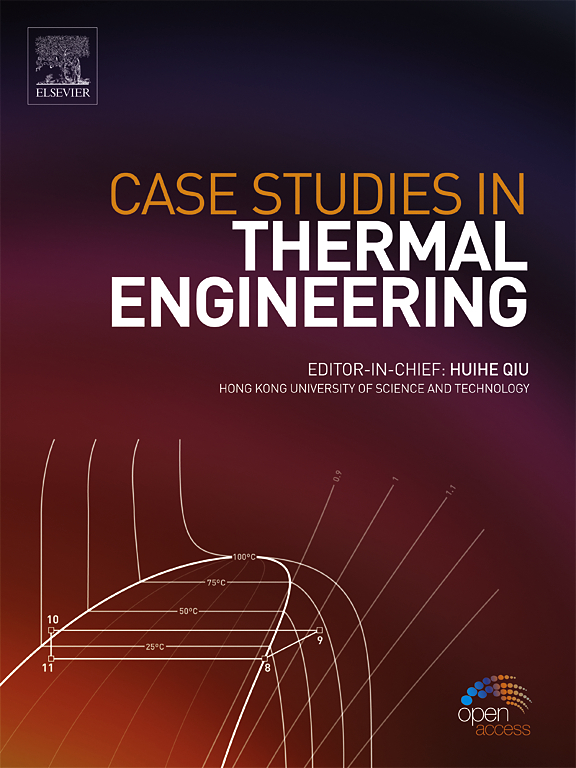The performance analysis of a compressed air energy storage (CAES) for peak moving with cooling, heating, and power production
IF 6.4
2区 工程技术
Q1 THERMODYNAMICS
引用次数: 0
Abstract
This study focuses on modeling and optimizing a multifaceted geothermal-based energy production system within the context of Denmark. The primary objectives revolve around enhancing system efficiency and reducing operational costs. The system under investigation comprises geothermal components, an organic Rankine cycle, a compressed air energy storage facility, and an absorption chiller. The organic Rankine cycle operates using refrigerants R123 and ammonia, effectively converting thermal energy into electricity and thermal energy for various applications. Optimization was carried out employing the Response Surface Method in tandem with Design-Expert software, facilitating the fine-tuning of objective functions. Two key objectives were selected: Exergy Round Trip Efficiency and cost rate, aimed at improving technical performance and curbing economic expenditure. A range of design variables were considered for optimization, including turbine and pump inlet temperatures, geothermal mass flow rate, turbine and pump efficiencies, compressor and gas turbine efficiency, inlet pressure to the compressed air energy storage tank, and evaporator pinch point temperature. The system reached an impressive exergy efficiency peak of 77.98 %, accompanied by a modest cost rate of 5.48 $/h. The costliest components in the system were the compressed air energy storage unit, followed closely by organic Rankine cycle 1 and organic Rankine cycle 2. In contemplating the practical implementation of this innovative energy system, ten cities in Denmark underwent rigorous analysis, accounting for technical and economic factors. Subsequent assessments identified Aarhus as the optimal location to initiate the system. The environmental results showed that by producing 13981.9 MW of electricity annually in Arhus City, it is possible to help reduce CO2 emissions by 2853.2 tons of CO2/year and avoid environmental costs of 68455.3 $/year. The environmental assessment also highlighted the potential for substantial green space expansion, estimating an additional 13 ha of green areas in the city of Aarhus, Denmark.
压缩空气储能(CAES)的性能分析,用于调峰制冷、供热和发电
本研究的重点是在丹麦范围内模拟和优化一个多元地热能源生产系统。主要目标是提高系统效率和降低运营成本。所研究的系统包括地热组件、有机朗肯循环、压缩空气储能设施和吸收式冷却器。有机郎肯循环使用制冷剂 R123 和氨,有效地将热能转化为电能和热能,用于各种应用。优化工作采用响应面法与 Design-Expert 软件相结合的方式进行,便于对目标函数进行微调。选择了两个关键目标:热能往返效率和成本率,旨在提高技术性能和降低经济支出。优化考虑了一系列设计变量,包括涡轮机和水泵入口温度、地热质量流量、涡轮机和水泵效率、压缩机和燃气轮机效率、压缩空气储能罐入口压力以及蒸发器夹点温度。该系统的能效峰值达到了令人印象深刻的 77.98%,成本率仅为 5.48 美元/小时。系统中成本最高的组件是压缩空气储能装置,其次是有机朗肯循环 1 和有机朗肯循环 2。在考虑这一创新能源系统的实际应用时,丹麦的十个城市进行了严格的分析,考虑了技术和经济因素。随后的评估确定奥胡斯为启动该系统的最佳地点。环境评估结果表明,通过在奥胡斯市每年生产 13981.9 兆瓦的电力,可以帮助减少每年 2853.2 吨的二氧化碳排放量,并避免每年 68455.3 美元的环境成本。环境评估还强调了大量扩大绿地的潜力,预计丹麦奥胡斯市将增加 13 公顷绿地。
本文章由计算机程序翻译,如有差异,请以英文原文为准。
求助全文
约1分钟内获得全文
求助全文
来源期刊

Case Studies in Thermal Engineering
Chemical Engineering-Fluid Flow and Transfer Processes
CiteScore
8.60
自引率
11.80%
发文量
812
审稿时长
76 days
期刊介绍:
Case Studies in Thermal Engineering provides a forum for the rapid publication of short, structured Case Studies in Thermal Engineering and related Short Communications. It provides an essential compendium of case studies for researchers and practitioners in the field of thermal engineering and others who are interested in aspects of thermal engineering cases that could affect other engineering processes. The journal not only publishes new and novel case studies, but also provides a forum for the publication of high quality descriptions of classic thermal engineering problems. The scope of the journal includes case studies of thermal engineering problems in components, devices and systems using existing experimental and numerical techniques in the areas of mechanical, aerospace, chemical, medical, thermal management for electronics, heat exchangers, regeneration, solar thermal energy, thermal storage, building energy conservation, and power generation. Case studies of thermal problems in other areas will also be considered.
 求助内容:
求助内容: 应助结果提醒方式:
应助结果提醒方式:


